外研版七年级上册 Unit 4 Time to celebrate An unusual Spring Festival课件(共14张PPT)
文档属性
| 名称 | 外研版七年级上册 Unit 4 Time to celebrate An unusual Spring Festival课件(共14张PPT) |  | |
| 格式 | pptx | ||
| 文件大小 | 10.2MB | ||
| 资源类型 | 教案 | ||
| 版本资源 | 外研版 | ||
| 科目 | 英语 | ||
| 更新时间 | 2025-04-28 10:08:45 | ||
图片预览

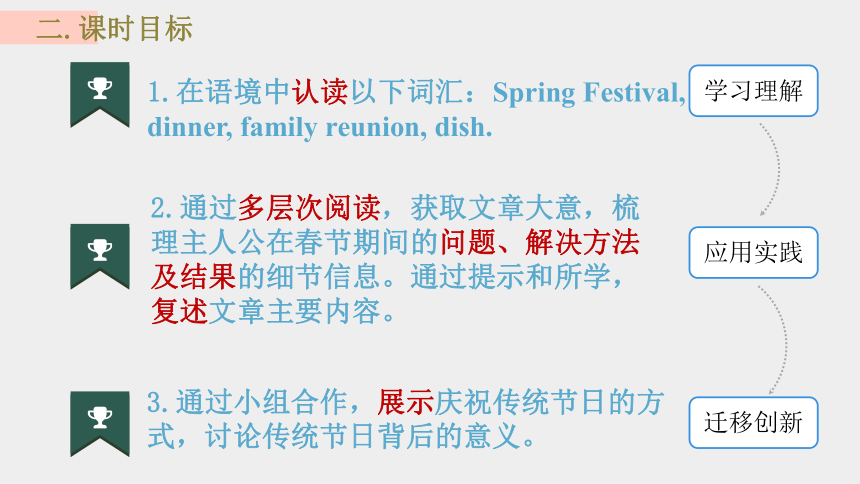
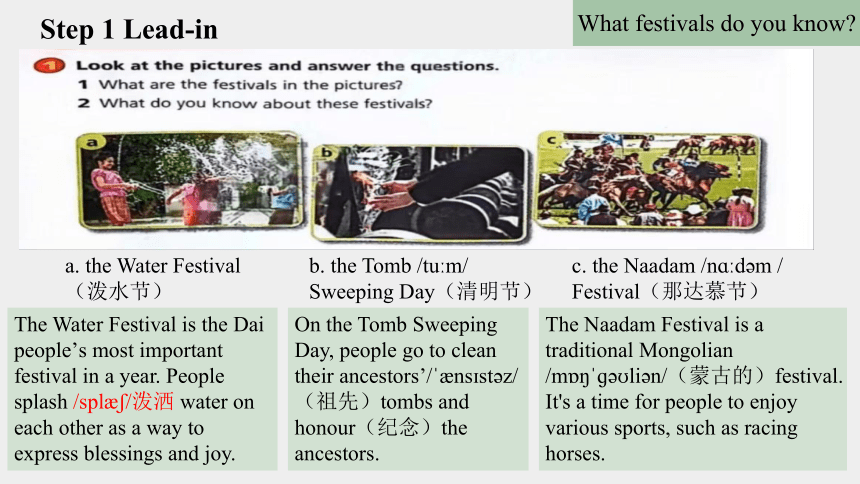
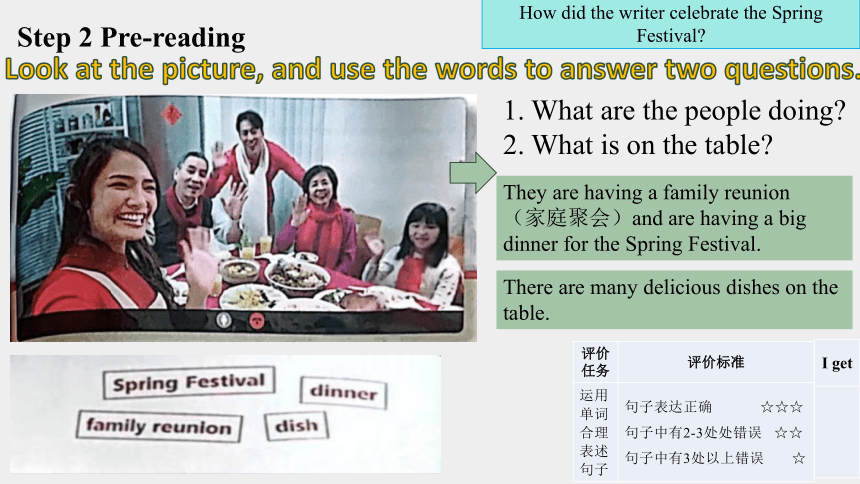
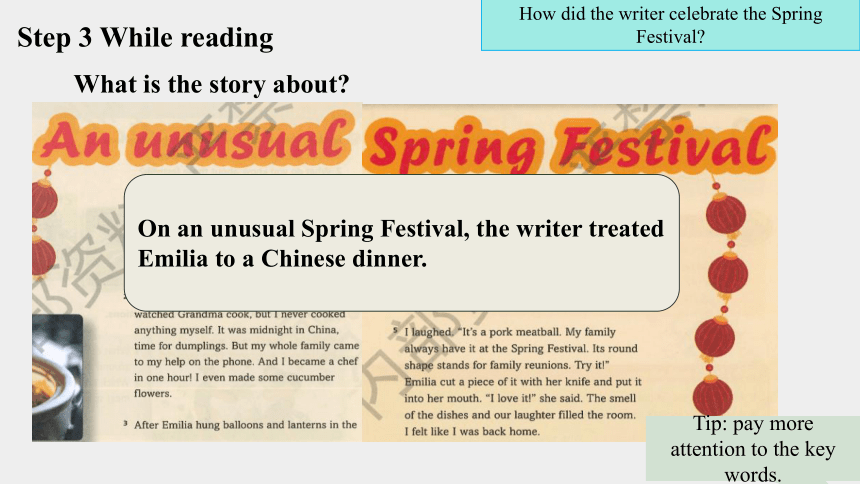
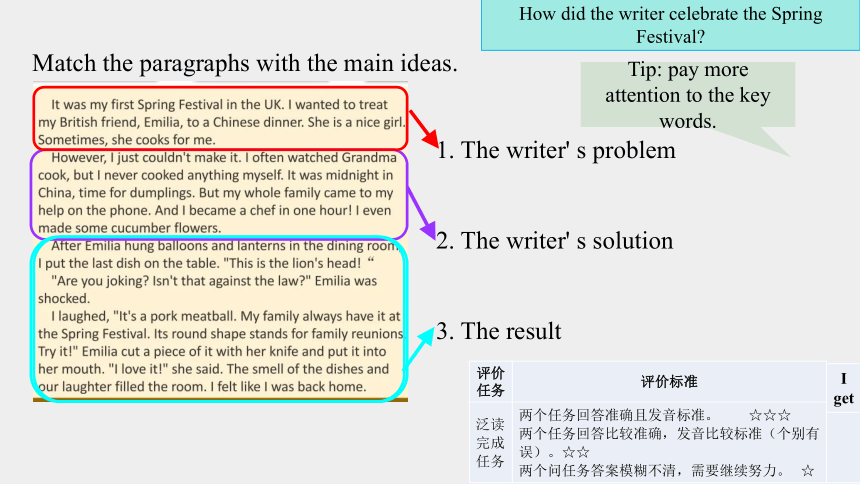
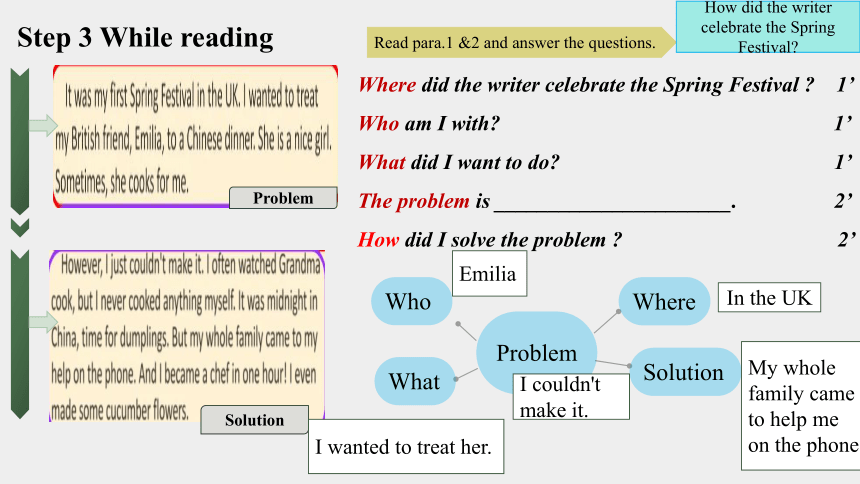
文档简介
(共14张PPT)
Unit 4 Time to celebrate
An unusual Spring Festival
1.在语境中认读以下词汇:Spring Festival, dinner, family reunion, dish.
3.通过小组合作,展示庆祝传统节日的方式,讨论传统节日背后的意义。
2.通过多层次阅读,获取文章大意,梳理主人公在春节期间的问题、解决方法及结果的细节信息。通过提示和所学,复述文章主要内容。
二.课时目标
学习理解
应用实践
迁移创新
Step 1 Lead-in
What festivals do you know
a. the Water Festival
(泼水节)
b. the Tomb /tu m/ Sweeping Day(清明节)
c. the Naadam /nɑ d m / Festival(那达慕节)
The Water Festival is the Dai people’s most important festival in a year. People splash /spl /泼洒 water on each other as a way to express blessings and joy.
On the Tomb Sweeping Day, people go to clean their ancestors’/ ns st z/(祖先)tombs and honour(纪念)the ancestors.
The Naadam Festival is a
traditional Mongolian /m ɡ li n/(蒙古的)festival. It's a time for people to enjoy various sports, such as racing horses.
Step 2 Pre-reading
How did the writer celebrate the Spring Festival
Look at the picture, and use the words to answer two questions.
1. What are the people doing
2. What is on the table
评价任务 评价标准
运用单词合理表述句子 句子表达正确 ☆☆☆
句子中有2-3处处错误 ☆☆
句子中有3处以上错误 ☆
I get
They are having a family reunion
(家庭聚会)and are having a big dinner for the Spring Festival.
There are many delicious dishes on the table.
Step 3 While reading
What is the story about
How did the writer celebrate the Spring Festival
Tip: pay more attention to the key words.
On an unusual Spring Festival, the writer treated Emilia to a Chinese dinner.
1. The writer' s problem
2. The writer' s solution
3. The result
Match the paragraphs with the main ideas.
How did the writer celebrate the Spring Festival
评价任务 评价标准
泛读完成任务 两个任务回答准确且发音标准。 ☆☆☆
两个任务回答比较准确,发音比较标准(个别有误)。☆☆
两个问任务答案模糊不清,需要继续努力。 ☆
I get
Tip: pay more attention to the key words.
Step 3 While reading
Problem
Solution
Read para.1 &2 and answer the questions.
How did the writer celebrate the Spring Festival
Problem
Who
Solution
Where
What
Where did the writer celebrate the Spring Festival 1’
Who am I with 1’
What did I want to do 1’
The problem is ______________________. 2’
How did I solve the problem 2’
In the UK
My whole family came to help me on the phone.
I wanted to treat her.
Emilia
I couldn't make it.
Result
Para3-5 Result
1.What can we do during the Spring Festival in the passage (至少两项) 2’
2.Translate the sentence into Chinese. 2’
Its round shape stands for family reunions.
3.Did they enjoy their meal How do you know
Yes. Because _____________________ and _____________ filled the room. The writer felt like she _________________. 6’
4.The writer felt ( )2’
A.sad B.happy C.shocked
Hang balloons and lanterns, cook (have) the lion's head , and cook (have) the dishes.
它的圆形代表着家庭团聚。
B
评价任务 评价标准
分段理解文本,回答问题。 15-19分 ☆☆☆
8—14分 ☆☆
7分及以下☆
I get
the smell of the dishes
their laughter
was back home
延时符
评价任务 评价标准
根据框架和关键词简单复述文章。 能准确流利的复述文章 ☆☆☆
能复述文章,但有所卡顿 ☆☆
只能读几个单词,不能完整复述 ☆
I get
Step 4 Post reading
Problem
Who
Solution
Where
What
Spring Festival
Chinese dinner
midnight
whole family
dish
shocked
back home
Thinking
What is unusual about the writer's Spring Festival?
Usually
But then
Usually the writer spends the Spring Festival with her family in China.
But then, the writer spent the Spring Festival with her friend Emilia in the UK, and she cooked a Chinese dinner for Emilia.
Talk about the way you often celebrate traditional festivals.
评价任务 评价标准
讨论如何进行节日介绍。 积极讨论分享见解。 ☆☆☆
参与讨论未发表见解。 ☆☆
不参与讨论。☆
I get
Step 4 Post reading
How do you celebrate festivals
The Spring Festival
My family
Put up paper cutting, set off fireworks and have a big dinner
Dumplings and tofu / t fu /
Happy
A: How do you usually celebrate ...
B: We always ...
A:Who do you celebrate it with
B: ...
A: What food do you have
B: ...
A: How do you feel
B: ...
I can get评价任务评价标准汇总本节课所得☆,自评。11—15个☆A6—10个☆B1—5个☆CStep 5 SummaryWhat have you learnt Love traditional culture and festivals.
Improve homework: (6—10个☆)
Repeat the text according to the blackboard design.
Expand homework(11—15个☆): Repeat the text and look up new ways to celebrate the festivals and share it next lesson.
A
B
C
延时符
Basic homework(1—5个☆): Recite the words and read the key sentences of this lesson.
Step 6 Homework
Traditional ways, others?
Unit 4 Time to celebrate
An unusual Spring Festival
1.在语境中认读以下词汇:Spring Festival, dinner, family reunion, dish.
3.通过小组合作,展示庆祝传统节日的方式,讨论传统节日背后的意义。
2.通过多层次阅读,获取文章大意,梳理主人公在春节期间的问题、解决方法及结果的细节信息。通过提示和所学,复述文章主要内容。
二.课时目标
学习理解
应用实践
迁移创新
Step 1 Lead-in
What festivals do you know
a. the Water Festival
(泼水节)
b. the Tomb /tu m/ Sweeping Day(清明节)
c. the Naadam /nɑ d m / Festival(那达慕节)
The Water Festival is the Dai people’s most important festival in a year. People splash /spl /泼洒 water on each other as a way to express blessings and joy.
On the Tomb Sweeping Day, people go to clean their ancestors’/ ns st z/(祖先)tombs and honour(纪念)the ancestors.
The Naadam Festival is a
traditional Mongolian /m ɡ li n/(蒙古的)festival. It's a time for people to enjoy various sports, such as racing horses.
Step 2 Pre-reading
How did the writer celebrate the Spring Festival
Look at the picture, and use the words to answer two questions.
1. What are the people doing
2. What is on the table
评价任务 评价标准
运用单词合理表述句子 句子表达正确 ☆☆☆
句子中有2-3处处错误 ☆☆
句子中有3处以上错误 ☆
I get
They are having a family reunion
(家庭聚会)and are having a big dinner for the Spring Festival.
There are many delicious dishes on the table.
Step 3 While reading
What is the story about
How did the writer celebrate the Spring Festival
Tip: pay more attention to the key words.
On an unusual Spring Festival, the writer treated Emilia to a Chinese dinner.
1. The writer' s problem
2. The writer' s solution
3. The result
Match the paragraphs with the main ideas.
How did the writer celebrate the Spring Festival
评价任务 评价标准
泛读完成任务 两个任务回答准确且发音标准。 ☆☆☆
两个任务回答比较准确,发音比较标准(个别有误)。☆☆
两个问任务答案模糊不清,需要继续努力。 ☆
I get
Tip: pay more attention to the key words.
Step 3 While reading
Problem
Solution
Read para.1 &2 and answer the questions.
How did the writer celebrate the Spring Festival
Problem
Who
Solution
Where
What
Where did the writer celebrate the Spring Festival 1’
Who am I with 1’
What did I want to do 1’
The problem is ______________________. 2’
How did I solve the problem 2’
In the UK
My whole family came to help me on the phone.
I wanted to treat her.
Emilia
I couldn't make it.
Result
Para3-5 Result
1.What can we do during the Spring Festival in the passage (至少两项) 2’
2.Translate the sentence into Chinese. 2’
Its round shape stands for family reunions.
3.Did they enjoy their meal How do you know
Yes. Because _____________________ and _____________ filled the room. The writer felt like she _________________. 6’
4.The writer felt ( )2’
A.sad B.happy C.shocked
Hang balloons and lanterns, cook (have) the lion's head , and cook (have) the dishes.
它的圆形代表着家庭团聚。
B
评价任务 评价标准
分段理解文本,回答问题。 15-19分 ☆☆☆
8—14分 ☆☆
7分及以下☆
I get
the smell of the dishes
their laughter
was back home
延时符
评价任务 评价标准
根据框架和关键词简单复述文章。 能准确流利的复述文章 ☆☆☆
能复述文章,但有所卡顿 ☆☆
只能读几个单词,不能完整复述 ☆
I get
Step 4 Post reading
Problem
Who
Solution
Where
What
Spring Festival
Chinese dinner
midnight
whole family
dish
shocked
back home
Thinking
What is unusual about the writer's Spring Festival?
Usually
But then
Usually the writer spends the Spring Festival with her family in China.
But then, the writer spent the Spring Festival with her friend Emilia in the UK, and she cooked a Chinese dinner for Emilia.
Talk about the way you often celebrate traditional festivals.
评价任务 评价标准
讨论如何进行节日介绍。 积极讨论分享见解。 ☆☆☆
参与讨论未发表见解。 ☆☆
不参与讨论。☆
I get
Step 4 Post reading
How do you celebrate festivals
The Spring Festival
My family
Put up paper cutting, set off fireworks and have a big dinner
Dumplings and tofu / t fu /
Happy
A: How do you usually celebrate ...
B: We always ...
A:Who do you celebrate it with
B: ...
A: What food do you have
B: ...
A: How do you feel
B: ...
I can get评价任务评价标准汇总本节课所得☆,自评。11—15个☆A6—10个☆B1—5个☆CStep 5 SummaryWhat have you learnt Love traditional culture and festivals.
Improve homework: (6—10个☆)
Repeat the text according to the blackboard design.
Expand homework(11—15个☆): Repeat the text and look up new ways to celebrate the festivals and share it next lesson.
A
B
C
延时符
Basic homework(1—5个☆): Recite the words and read the key sentences of this lesson.
Step 6 Homework
Traditional ways, others?
同课章节目录
